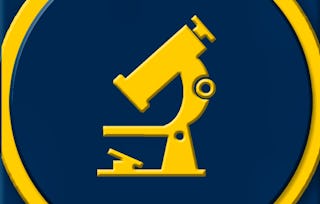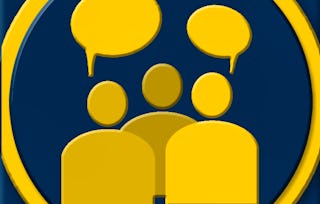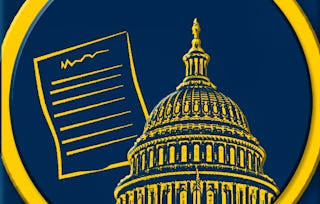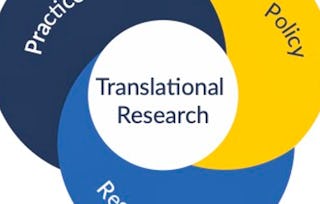The second phase of translational research — known as “T2” — assesses the value of applying discoveries to clinical practice, which leads to the development of evidence-based guidelines. This course focuses on clinical trials, the value of applying discoveries to clinical practice, and best practices for conducting research. You’ll see examples of human subjects research through clinical trials that have been translated into practice and, later, into basic scientific discoveries. You’ll also discuss the role of the federal government in supporting and regulating translational research conducted on humans.

Translating Research to Patients

Translating Research to Patients
This course is part of Translational Science Specialization

Instructor: Vicki Ellingrod
Included with
What you'll learn
Understand clinical research and clinical trials, the value of applying discoveries to clinical practice, and best practices for conducting research.
Explore the role of Institutional Review Boards in the ethical conduct of research.
Explore examples of health research and how it fits in the translational science spectrum.
Skills you'll gain
Details to know

Add to your LinkedIn profile
5 assignments
See how employees at top companies are mastering in-demand skills

Build your subject-matter expertise
- Learn new concepts from industry experts
- Gain a foundational understanding of a subject or tool
- Develop job-relevant skills with hands-on projects
- Earn a shareable career certificate

There are 3 modules in this course
Welcome to Week 1 of Translating Research to Patients. This week you will learn to 1) describe the four types of clinical trials research and the purpose for each type, and 2) define human subjects research and describe its purpose in the ethical conduct of translational research.
What's included
1 video8 readings2 assignments
Welcome to Week 2 of Translating Research to Patients. This week you will learn to 1) explain the role of the IRB in the ethical conduct of research, and 2) describe the role of the US Federal Drug Administration in the development and testing of pharmaceutical therapies.
What's included
5 readings2 assignments
Welcome to Week 3 of Translating Research to Patients. This week you will learn to 1) describe examples of human subjects research and identify where it fits in the translational research spectrum, and 2) review your Individualized Development Plan (IDP) and update it as needed.
What's included
4 videos1 reading1 assignment2 discussion prompts
Earn a career certificate
Add this credential to your LinkedIn profile, resume, or CV. Share it on social media and in your performance review.
Instructor

Offered by
Explore more from Basic Science
 Status: Free Trial
Status: Free TrialUniversity of Michigan
 Status: Free Trial
Status: Free TrialUniversity of Michigan
 Status: Free Trial
Status: Free TrialUniversity of Michigan
 Status: Free Trial
Status: Free TrialUniversity of Michigan
Why people choose Coursera for their career

Felipe M.

Jennifer J.

Larry W.

Chaitanya A.

Open new doors with Coursera Plus
Unlimited access to 10,000+ world-class courses, hands-on projects, and job-ready certificate programs - all included in your subscription
Advance your career with an online degree
Earn a degree from world-class universities - 100% online
Join over 3,400 global companies that choose Coursera for Business
Upskill your employees to excel in the digital economy
Frequently asked questions
To access the course materials, assignments and to earn a Certificate, you will need to purchase the Certificate experience when you enroll in a course. You can try a Free Trial instead, or apply for Financial Aid. The course may offer 'Full Course, No Certificate' instead. This option lets you see all course materials, submit required assessments, and get a final grade. This also means that you will not be able to purchase a Certificate experience.
When you enroll in the course, you get access to all of the courses in the Specialization, and you earn a certificate when you complete the work. Your electronic Certificate will be added to your Accomplishments page - from there, you can print your Certificate or add it to your LinkedIn profile.
Yes. In select learning programs, you can apply for financial aid or a scholarship if you can’t afford the enrollment fee. If fin aid or scholarship is available for your learning program selection, you’ll find a link to apply on the description page.
More questions
Financial aid available,

